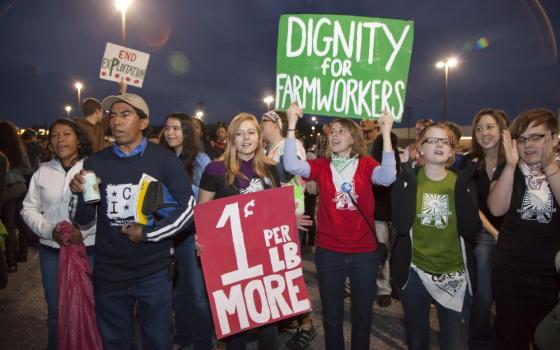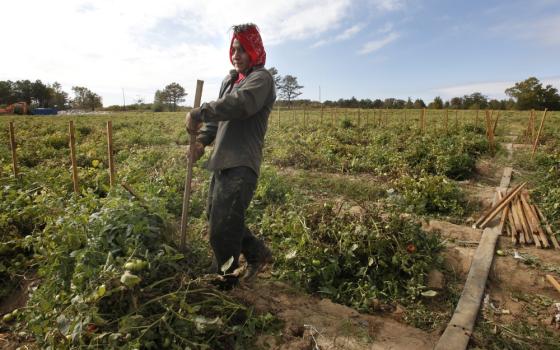Usually when we gather with family and friends we share a meal. Feasts are part of community celebrations, symbols of the reign of God and even of the world to come. All over the globe we gather around the Eucharistic table. There is something sacred about breaking bread together that strengthens our connections with one another.
December 18 is International Migrants Day. It’s a day set aside to become more aware of migrants, their struggles and for recognizing their contributions. Many of these international migrants are intricately involved in bringing food to our tables. “And yet, this important population remains largely invisible and unheard in society,” Ban Ki-moon, Secretary General of the U.N., reminded us in last year’s message.
So it also seems a fitting time to tell a story with a plot line involving migrants, food and strengthening connections. It’s really an Advent story: the invisible becoming visible, voices being heard, people expanding tables and the reign of God growing in our midst. It’s about active patient hope. Perhaps some of you will recognize yourselves as characters in this story because you’ve participated along the way. And it’s an adventure whose ending has yet to be written: We all still have an opportunity to join in its telling.
It’s the remarkable and hope-filled story of the Coalition of Immokalee Workers (CIW) in Florida.
CIW traces its beginning to 1993 when a few farmworkers gathering in a room at Our Lady of Guadalupe parish in Immokalee began organizing to address their working conditions, low pay and to advocate for their human rights.
The parish had already been active in ministering to the workers. Women religious from several communities including the School Sisters of Notre Dame and the Religious of the Sacred Heart of Mary, came in the 1970s and ‘80s to meet the needs of the people, serving in schools and health clinics, providing social and legal services, establishing soup kitchens and shelters and helping organize to better the conditions in the community. But the farmworkers themselves initiated CIW. That’s the crux of the story, what makes it important and the movement successful. Over the years the farmworkers were primarily from Mexico, Guatemala and Haiti.
The Coalition of Immokalee Workers’ history is an amazing study in the strategies of nonviolence and community building, employing work stoppages, hunger strikes and marches. They did their homework about the food industry, the supply chain and the economic dynamics forcing down the wages of tomato pickers. How many of us endorsed and participated in the four-year long national boycott of Taco Bell beginning in 2001? It demanded fair wages and better working conditions for the tomato pickers. The Fair Food Campaign was born and spread with agreements also being signed by McDonald’s, Burger King and Subway. They expanded into the supermarket arena: Whole Foods and Trader Joe’s signed on. Campaigns continue to get Publix, Kroger and AholdUSA to sign.
Meanwhile the CIW was also negotiating with the growers, and in late 2010 the CIW signed a groundbreaking agreement with the Florida Tomato Growers Exchange, covering over 90 percent of the Florida tomato industry. With this, the worker-driven Fair Food Program was launched with a “strict Fair Foods Fair Foods Code of Conduct, a cooperative complaint resolution system, a participatory health and safety program, and a worker-to-worker education process.” Compliance is monitored by a third party, The Fair Foods Standards Council. Chipotle Mexican Grill signed on in 2012 and Walmart in January of 2014.
Since the early 1990s CIW has also been engaged in investigating, exposing and assisting with the prosecution of abuses of workers especially labor trafficking and sexual exploitation of women workers with their Anti-Slavery Campaign. Their efforts were instrumental in the passage of the 2000 Trafficking Victims Protection Act. An integral part of the Fair Food Program is prevent abuse of workers.
We consumers have an important role to play: choosing what we buy. First of all, this takes awareness on our part. Where is our food coming from? Who is harvesting it? What is happening to our sisters and brothers? Are they being treated fairly? It’s a global concern.
I just learned about the new documentary film “Food Chains” about the CIW which was just released in November. It’s getting rave reviews. Or check out The Los Angeles Times four-part series (Dec. 7-14) “Product of Mexico” about the lives of those whose labor provide produce for our tables in the U.S.
CIW’s “Worker-driven Social Responsibility” model is a win-win-win-win for workers, growers, retailers and consumers alike. It’s holistic; recognizing we’re all in this together. It strengthens our connections. And it’s paying off. It’s a model worth spreading to other sectors of the economy and to other regions of the U.S. and to other countries.
Let us give thanks.
[Jan Cebula, OSF, is liaison to women religious in the United States for Global Sisters Report.]

